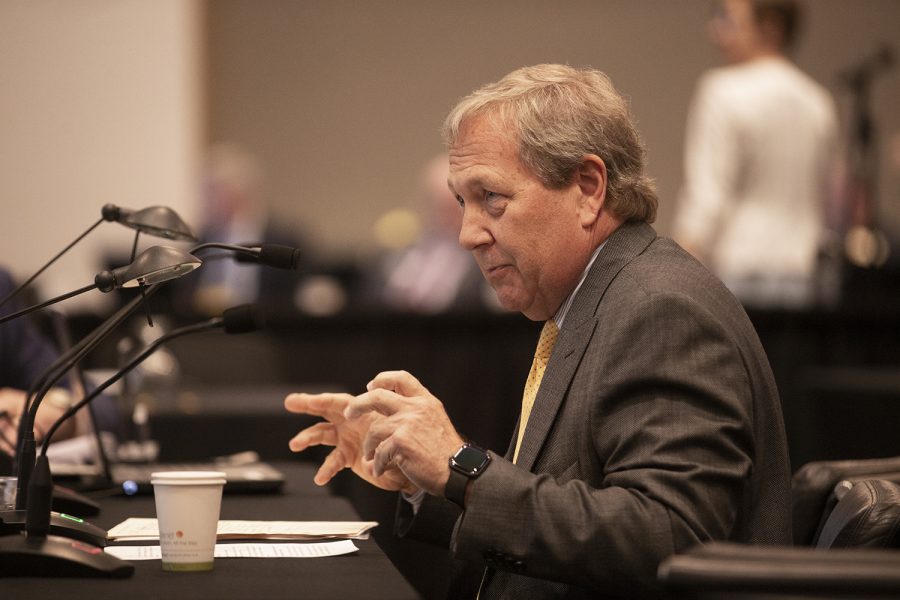University of Iowa president reports around $76 million in expenses, losses from COVID-19 response
The UI is modeling different scenarios for its fiscal 2021 budget as enrollment, tuition revenue, and state funding remain uncertain, but the CARES Act funds don’t make up for around $76 million in expenses and lost revenue.
University of Iowa President Bruce Harreld speaks in front of the state Board of Regents on Thursday, April 18, 2019.
April 30, 2020
The nearly $16.2 million the University of Iowa will receive through the federal Coronavirus Aid, Relief, and Economic Security Act is not enough to make up for the $76 million budget shortfall the institution faces amid responding to the COVID-19 pandemic, UI President Bruce Harreld told the state Board of Regents Thursday.
That share from the relief package only represents 10.49 percent of the total projected losses and expenses incurred during the period from March through August, Harreld said. Reimbursing students partially for their spring Housing and Dining contracts alone resulted in a nearly $16.1 million hit to the self-supporting residence-hall system.
The $76 million figure doesn’t include the UI Health Care enterprise, which he said is expected to face a financial toll of around $70 million through this month amid increased personal protective equipment expenses and canceled elective procedures.
RELATED: Iowa’s public universities’ future funding uncertain as coronavirus strains state economy
As Iowa lawmakers govern digitally for the time being with a suspended legislative session, there’s much uncertainty surrounding the state budget for fiscal 2021 and funding for Iowa’s public institutions. In the absence of financial clarity, Harreld said the colleges are modeling their budgets using a number of scenarios based on projected enrollment, tuition revenue, and state appropriations.
Harreld said the UI anticipates enrollment for the incoming class to be down around 9 to 10 percent, though returning undergraduate enrollment is holding steady for now. Enrollment in graduate and professional programs is seeing some strength, he said, as students opt to enroll in advanced degree programs instead of entering the job market amid historically high unemployment.
Because of uncertainties surrounding travel restrictions as countries across the globe take strides to contain the spread of COVID-19, he said the UI is doing financial modeling without revenue from international students. The university expects another downturn in international-student enrollment, advancing a downward trend seen across higher-education institutions in recent years.
Although state lawmakers have yet to pass a budget for the next fiscal year, leaving state funding levels uncertain, the regents on Thursday unveiled a plan to hold tuition rates steady, which would surely lead to a drop in tuition revenue as enrollment is expected to drop.
The governing board has recommended no increase to offer students and families “as much predictability as possible” amid the unprecedented COVID-19 pandemic. The regents will take a final vote on tuition rates in June after doing a first reading in a May 4 special meeting.
Overall, Iowa’s public universities face a collective fiscal shortfall of under $200 million, as Iowa State University projects losses and expenses to climb to $89 million and the University of Northern Iowa expects a revenue cut of around $28 million.
While the three regent universities are slated to receive $45.5 million from the $2.2 trillion CARES Act, which President Trump signed into law in March, the funds from the historic relief package also don’t cover losses at the other public institutions. The higher-education sector will receive around $14 billion from the historic relief package, which education advocates have said is insufficient to offset their financial losses from the novel coronavirus.
The U.S. Education Department earlier this month advised the nation’s universities to distribute around half of their aid from the relief package to cover students’ financial hardships. Students must have filed the Free Application for Federal Student Aid and meet other requirements, including being able to demonstrate they face a financial hardship because of COVID-19.
The UI shared Monday that students may apply through MyUI for financial support from the CARES Act starting May 4. According to the Office of Student Financial Aid website, financial hardships students face could include circumstances such as a job loss for the student or parent, or health care, technology, or child-care expenses.
RELATED: University of Iowa students may soon apply for funds from $16 million CARES Act share
Iowa’s three public universities are preparing for normal operations in the fall semester, Regent President Mike Richards said earlier this month, as the institutions continue to face several unknowns about the novel coronavirus and how to gather safely for classes and large events such as football games when the university communities return to campus.
The institutions reported Thursday they’re preparing for the possibility of a second surge of positive COVID-19 cases in the future. Harreld said the UI’s contemplated matters such as holding residence-hall space as a makeshift quarantine area and what it would look like to close down again, but he said he is comfortable the UI team is asking the right questions to face these uncertainties.
He said more testing, as many experts have urged, is key to understanding and acting upon the proper metrics.
The UI has moved swiftly in coordination with key state and federal partners in 60 days to cancel study-abroad programs, move to entirely virtual instruction, close residence halls, cancel elective procedures, and stand up new supply chains to secure much-needed personal protective equipment.
To resume daily activities and bring campus back to life, he said the UI will take a similarly purposeful, gradual approach.
“We all need to work together as a team, and there’s one thing I’m certain of,” he said. “That is together, we’ll actually be able to work through these issues, and that means not only with our community but also with you and with our state, and also with our federal government. And at the end of the day we’re doing all this, not only to get through this crisis, but come out of it even stronger.”















